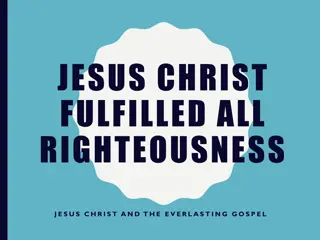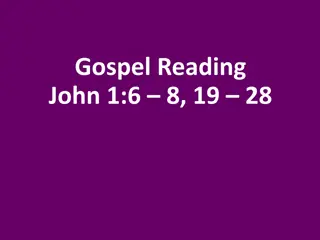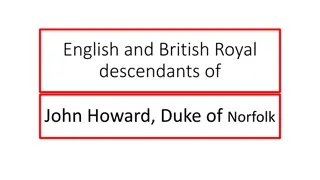
Understanding Logos in John 1:1 and its Significance
Explore the concept of "logos" in John 1:1, its various interpretations, and its relevance to understanding God's creative self-expression and communication. Delve into insightful perspectives from theologians and scholars on the meaning and implications of "logos" in the context of the Trinity.
Download Presentation

Please find below an Image/Link to download the presentation.
The content on the website is provided AS IS for your information and personal use only. It may not be sold, licensed, or shared on other websites without obtaining consent from the author. If you encounter any issues during the download, it is possible that the publisher has removed the file from their server.
You are allowed to download the files provided on this website for personal or commercial use, subject to the condition that they are used lawfully. All files are the property of their respective owners.
The content on the website is provided AS IS for your information and personal use only. It may not be sold, licensed, or shared on other websites without obtaining consent from the author.
E N D
Presentation Transcript
In the beginning was the word, and the word was with God, and what God was, the word was. (KJV) In the beginning was the Word, and the Word was with God, and the Word was God.
In the beginning. (Gen. 1 and John 1) Genesis 1. THE CREATION In the beginning -- The creation Chaos and darkness God hovering over the water God spoke thing into being Light overcoming the darkness God preparing a Garden of Delight for people and living among them THE FALL John 1. THE RESTORATION In the beginning -- the plan All things were made in accordance with the plan In the plan was light and life The darkness [it is assumed there is darkness] could not understand or overcome it The plan became flesh and lived in a tent among us, and we gazed at its glory.
the word logos ( ) Occurs over 300 times in the Greek New Testament Two different basic meanings: 1. logic, reason, and related ideas, such as plan, purpose, especially in action. 2. word, saying, message, instruction, etc. In our English Bibles as: account, appearance, book, command, conversation, eloquence, flattery, grievance, heard, instruction, matter, message, ministry, news, proposal, question, reason, reasonable, reply, report, rule, rumor, said, say, saying, sentence, speaker, speaking, speech, stories, story, talk, talking, teaching, testimony, thing, things, this, truths, what, why, word and words. Jesus Christ is not a lexical definition of logos.
The logosGods plan The word logosin John 1:1 refers to God s creative self-expression His reason, purposes and plans, especially as they are brought into action. It refers to God s self-expression, or communication, of Himself.
The logosGods plan Andrews Norton postulates that in John 1:1 perhaps the Disposing Power of God would be a good translation for logos (A Statement of Reasons for Not Believing the Doctrines of Trinitarians). Buzzard sets forth plan, purpose or promise as three acceptable translations (Buzzard and Hunting, The Doctrine of the Trinity, International Scholars Publications, 1998, pp. 191-196). James Broughton and Peter Southgate say that logoswas used to describe the thoughts and plan of God being put into action (The Trinity: True or False, The Dawn Book Supply, Nottingham, England, 1995. P. 246.) John Lightfoot writes: As His reason, it [logos] denoted His purpose or design; as His speech, it implied His revelation (J. B. Lightfoot, St. Paul s Epistles to the Colossians and Philemon, pp. 143, 144).
Trinitarian commentators read John 1:1 in light of the Trinity. They are forced to get a pre-incarnate Christ into the verse. But John was writing so that people would believe that Jesus was the Christ (John 20:31). No unbeliever would have thought that some pre-incarnate Jesus was the logos. Certainly the term [logos] might be recognizable [to John s audience], but its direct connection to Jesus assumes that Jesus, not merely his [John s] religious-philosophical context, determines its meaning. John is not relying on a background but on a foreground. (Edward Klink III, Exegetical Commentary on the New Testament: John, pp. 87, 88). John 20:31 (REV): but these are written so that you believe that Jesus is the Christ, the Son of God, and so that by believing you will have life in his name.
Christian teachers redefined the word logos. The word logosthen, denoting both reason and speech, was a philosophical term adopted by Alexandrian Judaism before St. Paul wrote, to express the manifestation of the Unseen God in the creation and government of the World. It included all modes by which God makes Himself known to man. As His reason, it denoted His purpose or design; as His speech, it implied His revelation. Christian teachers, when they adopted this term, exalted and fixed its meaning by attaching to it two precise and definite ideas: (1) The Word is a Divine Person, (2) The Word became incarnate in Jesus Christ. It is obvious that these two propositions must have altered materially the significance of all the subordinate terms connected with the idea of the logos. (John B. Lightfoot, St. Paul s Epistles to the Colossians and Philemon, pp. 143, 144. Bold emphasis ours, italics his).
Why do orthodox Christian Commentators have to make the logos into Jesus Christ? John 1:3 (REV): All things were made through it, and without it was not anything made that has been made (John 1:3 REV). But this kind of personification thinkingwas not new to the Jews or to the Greeks. When we turn from Palestine to Alexandria [Egypt], from Hebrew sapiential [wisdom] literature to that which was written in Greek, we find this creative wisdom identified with the Divine logos, Hebraism and Hellenism thus coming into contact. (J. H. Bernard, The International Critical Commentary: St. John. Vol. 1, p. cxxxix).
PERSONIFICATION The figure of speech personification occurs when something is given human characteristics to emphasize something. Psalm 35:10 portrays bones talking. Psalm 68:31 portrays Ethiopia as a woman with her hands outstretched to God. Isaiah 3:26 says the gates of Zion will lament and mourn. Isaiah 14:8 says the cypress trees will rejoice. 1 Corinthians 12:15 portrays a foot talking.
27) when he prepared the heavens, I was there; when he inscribed the horizon above the face of the deep; 28) when he fixed the clouds above, when he strengthened the springs of the deep; 29) when he set for the sea its limit so the waters would not disobey his mouth; when he marked out the foundations of the earth; 30) then I was beside him growing up, and I was his great delight daily, playing in his presence at every moment; 31) playing in the world his earth, and full of delight with humankind. WISDOM as a person Proverbs 8 (REV) 22) Yahweh created me at the beginning of his journey, prior to his works from back then. 23) From antiquity I was woven together, from the start, from the earlier times of the earth. 24) I was born when there were no deep oceans, when there were no springs abounding with waters.
Wisdom and the word (logos) The Aramaic Targums are well known for describing the wisdom and action of God as His word. And the word of the Lord was Joseph s helper (Gen. 39:2). And Moses brought the people to meet the word of the Lord (Exod. 19:17). And the word of the Lord accepted the face of Job (Job 42:9). And the word of the Lord shall laugh them to scorn (Ps. 2:4). They believed in the name of His word (Ps. 106:12). (Examples from Dr. John Lightfoot, A Commentary on the New Testament from the Talmud and Hebraica, Vol. 3, p. 238).
The Uniqueness of logos The use of logos in the prologue of John is unique in John This makes perfect sense because: John 1:14 (REV) And the word became flesh, and lived in his tent among us (and we gazed at his glory, a glory as of the only begotten from the Father), full of grace and truth.
Logos not muthos Muthos was the word that described the body of beliefs about the gods that came down through the centuries in the Greek world. We now use that word brought into English myth and mythology. Mystical Beyond rational comprehension Contradictory John uses logosto describe what was with God, the rational, logical, plans and purposes of God, especially as they are put in action.
Logos not muthos We must point out here the difference between mystery and contradiction; the former is something that cannot be fully explained to or comprehended by the human mind, whereas the latter is just nonsense two concepts that cancel each other out and together make an absurdity (Roger Olson, Against Calvinism, p. 105). Verbalism. a theoretical game in which words really carry no ascertainable sense and phrases no ascertainable meaning. (Richard Daane, The Freedom of God, p. 71).
And the word was with God Strange language to us; not strange to the Jews Proverbs 13:10 (REV) Over-confidence only causes strife, but Wisdom is with those who accept advice. Proverbs 2:1 (REV) My son, if you receive my words, and store up my commandments with you, (HCSB) My son, if you will receive my words and store my commands inside you, Job 23:14 (REV) For he performs what is appointed for me. Many such things are with him. (HCSB) He will accomplish what is decreed for me, and he has many plans like this. Proverbs 11:2 (REV) Over-confidence comes, then dishonor comes, but Wisdom is with the modest.
Gnosticism Another reason for the statement, and the logos was with God. Gnosticism was taking root in Christianity. Gnosticism took many forms. But a common Gnostic belief: There was a supreme and unknowable Being, the Monad. The Monad produced various gods, who in turn produced other gods. One of them, the Demiurge, created the earth and then ruled over it. He was an angry, evil and jealous god, and he was the god of the Old Testament, Elohim. The Monad sent another god, Christ, to bring special gnosis (knowledge) to mankind and free them from the influence of the evil Elohim. Thus, a Gnostic Christian would agree that Elohim created the heavens and earth, but would not agree that He was the supreme God. Also, most Gnostics would say that Elohim and Christ were at cross-purposes with each other. But John 1:1 says that the logos was with God,
and what God was, the word was. En arch n ho logos, In [the] beginning was the logos, , , kai ho logos n pros ton theon, and the logos was with the God, kai theos n ho logos and God-like was the logos. .
and what God was, the word was. In a case like this we cannot do other than go to the Greek, which is theos en ho logos. Ho is the definite article, the, and it can be seen that there is a definite article with logos, but not with theos. When in Greek two nouns are joined by the verb to be, and when both have the definite article, then the one is fully intended to be identified with the other; but when one of them is without the article, it becomes more an adjective than a noun, and describes rather the class or sphere to which the other belongs. An illustration from English will make this clear. If I say, The preacher is the man, I use the definite article before both preacher and man, and I thereby identify the preacher with some quite definite individual man whom I have in mind. But, if I say, The preacher is man, I have omitted the definite article before man, and what I mean is that the preacher must be classified as a man, he is in the sphere of manhood, he is a human being.
and what God was, the word was. John has no article before theos, God. The logos, therefore, is not identified as God or with God; the word theos has become adjectival and describes the sphere to which the logos belongs. We would, therefore, have to say that this means that the logos belongs to the same sphere as God; without being identified with God, the logos has the same kind of life and being as God. Here the NEB [New English Bible] finds the perfect translation: What God was, the Word was. (William Barclay, Jesus as They Saw Him, pp. 21 and 22).
and what God was, the word was. Daniel Wallace is a Trinitarian and a scholar of Greek grammar. He examined the grammatical possibilities of the last theos in John 1:1 1. indefinite ( a god ) 2. definite ( the God ) 3. qualitative (that the logos has the qualities of God; the noun logos is being used to function like an adjective and give qualities to the noun logos) Wallace concludes, The most likely candidate for theosis qualitative. Possible translations are as follows: What God was the Word was (NEB). (Wallace, Greek Grammar Beyond the Basics, Zondervan, 1996, p. 269).
THANK YOU FOR YOUR TIME AND ATTENTION GOD BLESS YOU!!!






















